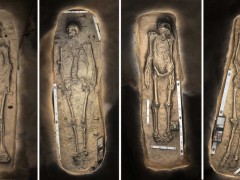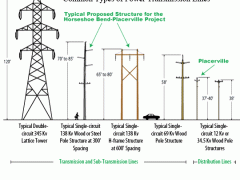hot [hɔt] adj. 带电的,充电的
fireman [ˈfaiəmən] n. 消防队员
【构】fire(火)+man(人)=fireman(消防人员)
【扩】firefighter 消防队员
* * *
A: How did you escape then?
B: A fireman saved me.
A:你当时是怎么逃脱的?
B:一位消防员救了我。
* * *
cause [kɔːz] v. 引起;n. 原因
【扩】lead to 引起
* * *
A: What caused the failure?
B: It was caused by his carelessness.
A:这次的失败是什么原因引起的?
B:是他的粗心大意引起的。
* * *
examine [iɡˈzæmin] v. 检查
【派】examination 考试
* * *
A: I have finished my homework.
B: You'd better examine it.
A:我的家庭作业做完了。
B:你最好再检查一遍。
* * *
accidentally [ˌæksiˈdentəli] adv. 意外地,偶然地
* * *
A: She discovered the secret accidentally.
B: Did she tell it to anyone else?
A:她意外地发现了这个秘密。
B:她有没有将这个秘密告诉其他人?
* * *
remains [riˈmeinz] n. 尸体,残骸
wire [ˈwaiə] n. 电线
volt [vəult] n. 伏特(电压单位)
* * *
A: This is the socket for the electric shaver. It is 220 volts.
B: Good. I can use it directly.
A:这是电剃须刀的插座,是220伏的。
B:太好了,我可以直接用了。
* * *
power line [ˈpauə-lain] 电力线
solve [sɔlv] v. 解决
【扩】tackle 处理
【搭】solve the problem 解决问题
* * *
A: Could you help me to solve the problem?
B: Let me look at it first.
A:你能帮我解决这个问题吗?
B:我先看看。
* * *
mystery [ˈmistəri] n. 谜
snatch [snætʃ] v. 抓住
spark [spɑːk] n. 电火花
* * *
A: What's wrong with my car?
B: You just need to change the spark plugs.
A:我的车怎么了?
B:你只要更换火花塞就行了。
adverb [程度副词]热切地,紧迫地;热 - The role of women in war has been a hot topic of debate since the Gulf conflict.
verb [vt. 及物动词]使热,把…加温(hot up);变热(hot up) - The media, meanwhile, has blown hot and cold over the affair.
adjective [原级]温度高的,烫的;感到(或致使)热得不舒服;辣的;活跃的,激烈的;<非正式>热门的,流行的;<非正式>性感的;<非正式>棘手的,危险的;有望成功的;暴躁的;(场面,说话等)过激的,过火的;认为…重要的,对…严格的;(音乐)节奏强的;<非正式>(赃物)难以销掉的(由于很容易被识别);快找到了,快猜中了;<非正式>(电路)高电压的,带电的 - When the oil is hot, add the sliced onion.
hot adj. 热的;新鲜的;棘手的;带电的, 充电的
- hot-hot-hot 麻辣烫
- hot-wings 辣鸡翅
- hot dog 热狗
- hot-tempered 火暴(脾气)的 (temper n. 脾气)
- hot line 热线
- hot topic 热门话题
- hot cake 热蛋糕
- It sells like a hot cake/cakes. 表示一个东西的畅销, 热销
- best seller 畅销的东西
- hot potato 棘手的问题
- hot news 最热点的新闻
noun [专属名词]消防队员;救火队员;锅炉工 - What's his job? He's a fireman.
- hydrant n. 消防栓, 消防龙头
- fire extinguisher 灭火器 (extinguisher n. 熄灭者, 灭火器)
- extinguish =put out 灭火
noun [抽象名词]原因,起因:导致某事发生的事物、事件或情况。 - Smoking is the biggest preventable cause of death and disease.
noun [抽象名词]事业,目标:为之奋斗、支持或捍卫的原则、目标或事业。 - A cause is an aim or principle which a group of people supports or is fighting for.
verb [vi. 不及物动词]导致,引起:使某事发生或产生某种结果。 - To cause something, usually something bad, means to make it happen.
cause sth. 引起麻烦
- Carelessness causes accidents. 粗心导致事故
- Pride causes failure. 骄傲使人失败
cause sb. to do sth. 引起某人做某事, 导致某人做某事
- Illness caused him to lose his temper. (lose one’s temper 发火)
n. 原因,强调事情发生的直接原因(一个) because 因为
- Idealistic young people died for the cause. 理想主义的年轻人为这项事业而献身。
- Unemployment was the chief cause of poverty. 失业是贫穷的主要原因。
- It had been the cause of much emotional upset. 那便是使人情绪一落千丈的原因。
| reason 理由,其他各种的理由(很多个) | This was the real reason for her call. 这是她打电话的真实原因。 |
|---|
verb [vi. 不及物动词]检查,调查;考核,测验;(医生)诊察;(尤指在法庭上)审问,查问 - He examined her passport and stamped it.
adverb [方式副词]意外地,偶然地; 意外失误地 - He accidentally sawed through a cable.
noun [具体名词]剩余物,残留物;遗体,遗骸;古迹,遗迹 - The remains of something are the parts of it that are left after most of it has been taken away or destroyed.
verb [vi. 不及物动词]仍然是,保持不变;逗留,留下;剩余,余留(remain 的第三人称单数形式) - You can say that something remains when it still exists.
remains (n.) 遗物,遗迹,废墟
- the remains of a meal 剩饭菜
- His remains are buried in the churchyard. 他的遗体埋在教堂墓地。
- the remains of ancient Rome 古罗马遗址
the rest of sth. 与 the remainder of sth. 这两者都表示“其余的,剩余的”,但用法稍有不同。
| 表达方式 | 含义 | 示例句 |
|---|---|---|
| the rest of sth. | 剩余的,余下的部分 | the rest of the semester 学期剩余部分 |
| the remainder of sth. | 剩余的,余下的部分(常用于正式文体) | the remainder of the semester 学期剩余部分 |
这两个表达是可以互换的,指代“剩余部分”,通常是可数名词或不可数名词的剩余。
what is left of sth. 与what remains of sth.
- what is left of sth. 和 what remains of sth. 是相同含义的表达,都指“剩余部分”。
- Only two stray dogs benefited from all this confusion, for they greedily devoured what was left of the cake.只有两只流浪狗从所有的混乱中受益,它们贪婪地吃掉了剩余的蛋糕。
- It is recounted of Thomas Carlyle that when he heard of the illness of his friend, Henry Taylor, he went off immediately to visit him, carrying with him in his pocket what remained of a bottle of medicine formerly prescribed for an indisposition of Mrs. Carlyle’s.据说托马斯·卡莱尔听说他的朋友亨利·泰勒生病后,立即去看望他,并带着他口袋里剩余的曾经为卡莱尔夫人开具的药瓶。
小结
- remains 常用来指代历史遗物或物品的残留部分(如“遗体”或“古遗址”)。
- the rest of 和 the remainder of 都表示“剩余的部分”,其中 the rest of 更口语化,the remainder of 更正式。
- what is left of 和 what remains of 可以互换,表示“剩余部分”。
noun [抽象名词]金属丝,金属线;电线,导线;隐蔽式电子收听器;<美>电报;<美>(赛马)起跑线,终点线(the wire);铁丝网(the wire);用金属丝制的,用金属线制的;<美>通讯社 - What gauge of wire do we need?
verb [vi. 不及物动词]给…接上电线,接通(电源);(用电线)接通,连接;电汇(钱款);发电报给(某人);用金属线固定(或加固);给…安装窃听器;用金属网诱捕(动物);(槌球)在拱门边阻挡(球,射球,选手) - Each of the homes has a security system and is wired for cable television.
noun [专属名词]伏特(电压单位);环骑;闪避 - Schoolboy John Doyle suffered a 25,000-volt electric shock and lived.
noun [专属名词]电力线:一种电线、电缆或电管,用于输送电力。 - Voltage provided to a ballast by a power line or power supply.
verb [vt. 及物动词]解决,处理;解释,解答 - Their domestic reforms did nothing to solve the problem of unemployment.
noun [专属名词]难以理解(或解释)的事物,奥秘;神秘的人(或事物);不可思议;疑案小说(或电影、戏剧);(宗教信仰的)奥义,真谛;圣餐礼 - If you talk about the mystery of someone or something, you are talking about how difficult they are to understand or know about.
adjective [原级]神秘的,身份不明的 - A mystery person or thing is one whose identity or nature is not known.
be a mystery to sb. 对于sb.来说无法理解
- It's a complete mystery to me why she married him at all!
verb [vt. 及物动词]一把抓住,立马夺下;夺去,抢走;抓住机会做(某事);侥幸获得(胜利),险胜 - If something is snatched from you, it is stolen, usually using force. If a person is snatched, they are taken away by force.
noun [抽象名词]抢夺,偷窃;(歌曲或谈话的)片段;片刻,一会儿;(举重)抓举;<非正式>(女性的)阴部 - A snatch of a conversation or a song is a very small piece of it.
noun [专属名词]导火线,诱因;火花,火星;电火花;一丝,略微;生气,活力,才华;愤怒的情感,激烈的情绪;<非正式>军队中对无线电报务员(或电工)的昵称(Sparks);生龙活虎的小伙子;(内燃机里火花塞的)放电 - A spark is a flash of light caused by electricity. It often makes a loud sound.
verb [vt. 及物动词]引发,触发;产生火花(电火花);点燃;增加趣味(或活力、风味等);求婚 - If something sparks, sparks of fire or light come from it.












